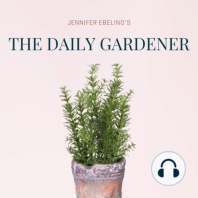10 min listen

July 11, 2022 Horace Walpole, Dorothy Thompson, Oliver Sacks, India's First Cryptogamic Garden, Botany for the Artist by Sarah Simblet, and Mary Russe…
July 11, 2022 Horace Walpole, Dorothy Thompson, Oliver Sacks, India's First Cryptogamic Garden, Botany for the Artist by Sarah Simblet, and Mary Russe…
ratings:
Length:
15 minutes
Released:
Jul 11, 2022
Format:
Podcast episode
Description
Subscribe Apple | Google | Spotify | Stitcher | iHeart Support The Daily Gardener Buy Me A Coffee Connect for FREE! The Friday Newsletter | Daily Gardener Community Historical Events 1788 On this day, Horace Walpole wrote about the powerful impact of rain on the garden. He wrote, My verdure begins to recover its bloom.. in this country, nobody pays his debts like rain. It may destroy your flowers, but you cannot complain of want of fruit; cherries, apples, walnuts, are more exuberant than their leaves. 1893 Birth of Dorothy Thompson, American journalist and radio broadcaster. She is remembered as the First Lady of American Journalism. In 1934, Dorothy was the first American journalist to be expelled from Nazi Germany. In her final book, The Courage to Be Happy (1957), she wrote: I am inclined to think that the flowers we must love are those we knew when we were very young, when our senses were most acute to color into smell, and our natures most lyrical. 1933 Birth of Oliver Sacks, British neurologist, naturalist, historian of science, and writer. I once watched a video featuring Dr. Oliver Sacks, who practiced medicine in NYC across from the New York Botanical Garden (NYBG). In the video, Oliver reflected on the garden and its meaning. I've cobbled together a few of his inspiring thoughts. Here's what he said: I think of this garden as a treasure. First, it's a haven. In a noisy, crowded New York, we need a haven; we wander around, and time doesn't matter too much. When I worked at the hospital opposite the garden, I used to come in every day. Specifically, I would come in after seeing my patients but before writing up my notes. And, I would walk around the garden and put everything out of consciousness except the plants and the air. But, by the time I got back, the patient's story would have crystallized in my mind [and then] I could then write it straight away. But I needed this sort of incubation in the garden, and to go for a walk in the garden; that sort of thing is an essential thing for me in writing. I think nature has a healing effect; the garden the closest one can come to nature. The garden has affected me and does affect me in various ways; it's not just the pleasure of walking around but [also] the very special virtues of the library and the museum and the fact that, in some ways, this is a university as well as a garden. I just feel very comfortable in the garden, and whenever people come to New York from out of town or out of the country, I say let's go to the garden. I would like to quote a couple of lines from a TS Eliot poem: Oh, do not ask, 'What is it?' Let us go and make our visit. In his book, The River of Consciousness, Oliver wrote, While most of the flowers in the garden had rich scents and colors, we also had two magnolia trees, with huge but pale and scentless flowers. The magnolia flowers, when ripe, would be crawling with tiny insects, little beetles. Magnolias, my mother explained, were among the most ancient of flowering plants and had appeared nearly a hundred million years ago, at a time when “modern” insects like bees had not yet evolved, so they had to rely on a more ancient insect, a beetle, for pollination. Bees and butterflies, flowers with colors and scents, were not preordained, waiting in the wings—and they might never have appeared. They would develop together, in infinitesimal stages, over millions of years. The idea of a world without bees or butterflies, without scent or color, affected me with a sense of awe. 2021 On this day, India's first cryptogamic garden, with nearly fifty different species, is opened. Cryptogams are non-seed-bearing plants. These primitive plants do not reproduce through seeds, for example, algae, bryophytes (moss, liverworts), lichens, ferns, fungi, etc. The garden is located in the Deoban area of Dehradun in Uttarakhand and is situated at 9000 feet and spread over three acres. Grow That Garden Library™ Book Recommendation Botany for
Released:
Jul 11, 2022
Format:
Podcast episode
Titles in the series (100)
May 2, 2019 Plant Sales, May Fools Day, Rivdan, The White House Gardens Symposium, Jimi Hendrix, Stonewall Jackson, Didier Decoin, Dividing Iris, and The Enid A. Haupt Garden: Ah May... the Month of Plant Sales. When I started gardening, I would Plant Sale away my Saturdays in May with my dear friend Judy. We would plan our way to a successful sale day, waking up while it was still dark out. Then... by The Daily Gardener